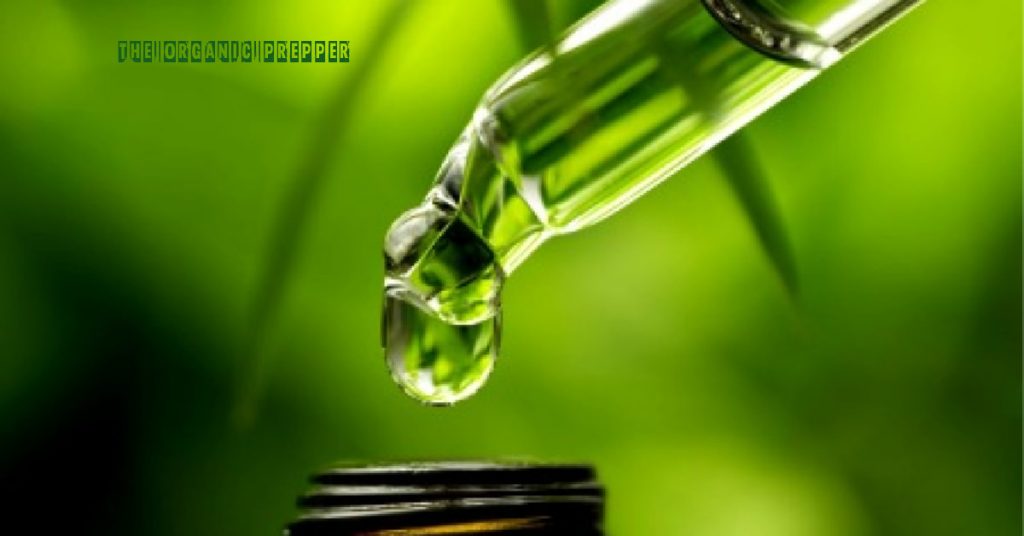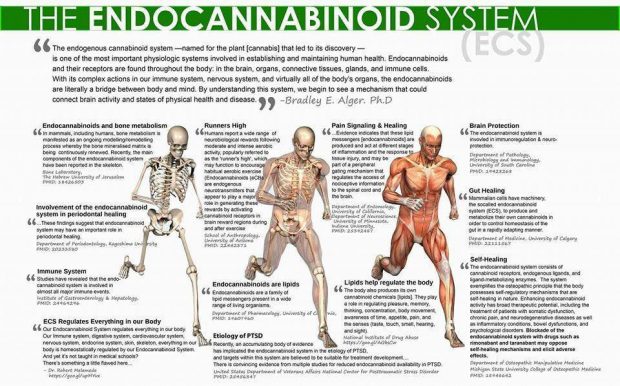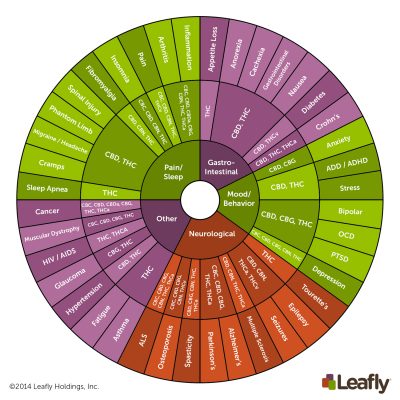If you're new here, you may want to subscribe to my RSS feed. Thanks for visiting!
by Lisa Egan
As more people seek natural remedies for health problems – and as more states legalize medical marijuana – interest in cannabidiol (commonly known as “CBD”) is growing.
It’s about time because CBD is a fascinating compound that has tremendous therapeutic value.
The list of health concerns and conditions CBD has been shown to benefit include:
- Chronic pain and inflammation
- Arthritis (including rheumatoid and psoriatic)
- Epileptic seizures
- Neuropathic pain (as seen in conditions like multiple sclerosis)
- Anxiety
- Post-traumatic stress disorder (PTSD)
- Cancer (see here, here, here, and here)
- Serious neurological conditions including Alzheimer’s disease, multiple sclerosis, and Parkinson’s
- Diabetes (see here and here)
- Cardiovascular protection
Unfortunately, decades of disinformation and outright lies about the cannabis plant have led many to believe that marijuana and hemp are dangerous and have no medicinal value.
Of course, nothing could be further from the truth.
Thankfully, a growing body of research is revealing the abundant benefits of the cannabis plant.
Let’s explore those benefits, but first – let’s talk about what CBD is and what it does in the body.
What is CBD?
Cannabidiol (CBD) is one of over 60 compounds found in cannabis that belong to a class of ingredients called cannabinoids.
Cannabinoids are a diverse set of chemical compounds that bind to special receptors in the human body that make up what is known as the endocannabinoid system, explains Medical Jane:
The “key and lock” metaphor is often used to describe this process. The human body possesses specific binding sites (“locks”) on the surface of many cell types, and our body produces several endocannabinoids (“keys”) that bind to these cannabinoid receptors (CB) to activate or “unlock” them.
…
When a cannabinoid causes a receptor to act in the same way as it would to a naturally occurring hormone or neurotransmitter, then it is labeled “agonist.” On the other hand, if the cannabinoid prevents the receptor from binding to the naturally occurring compound, thereby causing the resulting event (e.g., pain, appetite, alertness) to be altered or diminished, it is labeled “antagonist.” Research is mounting to better understand how specific cannabinoids can unlock (or lock in some cases) specific receptors.
…
Over 100 phytocannabinoids have been identified in the cannabis plant, many of which have documented medicinal value. Most are closely related or differ by only a single chemical part. The most talked-about and researched cannabinoids found in the cannabis plant are tetrahydrocannabinol (THC) for its psychoactive properties (“high feeling”) and cannabidiol (CBD) for its healing properties.
For more information on specific cannabinoids, please see this impressive reference guide: The Ultimate Guide to Cannabinoids in Cannabis.
What is the endocannabinoid system?
The endocannabinoid system is a biological system which plays many important roles in the human body. It is responsible for the physical and psychological effects of cannabis.
Scientists first discovered the system while trying to understand the effects of cannabis, and named it the endocannabinoid system for this reason. Endo stands for endogenous, which means originating within the body. Cannabinoid refers to the group of compounds that activate this system, explains Leaf Science (for a detailed explanation of the endocannabinoid system, please see The Endocannabinoid System: A Beginner’s Guide).
Here’s more on the endocannabinoid system, from Project CBD:
The discovery of receptors in the brain that respond pharmacologically to cannabis—and the subsequent identification of endogenous cannabinoid compounds in our own bodies that bind to these receptors—has significantly advanced our understanding of human biology, health, and disease.
It is an established scientific fact that cannabinoids and other components of cannabis can modulate many physiological systems in the human brain and body. Cannabinoids are chemical compounds that trigger cannabinoid (and other) receptors.
Extensive preclinical research—much of it sponsored by the U.S. government—indicates that CBD has potent anti-tumoral, antioxidant, anti-spasmodic, anti-psychotic, anti-convulsive, and neuroprotective properties. CBD directly activates serotonin receptors, causing an anti-anxiety effect, as well.
According to High Times,
Without distorting the science too much, you could say that human beings are “hard-wired” for weed. The endocannabinoid system runs deep and touches all of the major systems of the body. And that’s why weed can do so many things for us, from altering and regulating moods to stimulating appetites and reducing pain.
And even though cannabidiol has no toxicity for humans—meaning, it doesn’t make you intoxicated (i.e. high)—it is highly reactive with the endocannabinoid system.
To put things as simply as possible, CBD makes things happen. When it binds to the endocannabinoid system’s receptors, it stimulates all kinds of changes in the body.
Most of those changes are incredibly beneficial, and researchers keep uncovering real and potential medical uses for them.
What are the differences between cannabis and hemp?
Hemp is a plant in the Cannabis family.
So is marijuana.
Here’s an explanation from Medical Jane:
The term cannabis (or marijuana) is used when describing a Cannabis Sativa plant that is bred for its potent, resinous glands (known as trichomes). These trichomes contain high amounts of tetrahydrocannabinol (THC), the cannabinoid most known for its psychoactive properties.
Hemp, on the other hand, is used to describe a Cannabis Sativa plant that contains only trace amounts of THC. Hemp is a high-growing plant, typically bred for industrial uses such as oils and topical ointments, as well as fiber for clothing, construction, and much more.
According to a 1976 study published by the International Association of Plant Taxonomy, “both hemp varieties and marijuana varieties are of the same genus, Cannabis, and the same species, Cannabis sativa. Further, there are countless varieties that fall into further classifications within the species Cannabis sativa.”
In fact, scientists believe the early separation of the cannabis gene pool led to two distinct types of cannabis plants. The two species (or subspecies) of cannabis are known as Cannabis indica and Cannabis sativa.
To summarize:
- Cannabis is a genus of flowering plants in the family Cannabaceae.
- Cannabis refers to a plant family that includes hemp and marijuana (and many other plants).
- Hemp is a variety of cannabis that is used for many purposes and contains very low levels of THC.
- Marijuana is a variety of cannabis that contains high levels of THC.
CBD is the same whether it is sourced from hemp or from marijuana, Leaf Science explains:
“CBD, the actual molecule, is the same from both plants,” says Martin A. Lee, director of the educational nonprofit Project CBD and author of Smoke Signals. “Where it gets different is the plant itself.”
CBD, like other cannabinoids, is found in the plant’s resin. Resin is concentrated in the flowering tops and leaves of the plant, and is less present in the stalks and seeds.
What is THC?
Hemp plants produce more CBD than THC, while marijuana produces more THC than CBD. Interestingly, research has shown that CBD acts to reduce the psychoactive effects of THC.
Hemp plants contain very little THC (0.3%). Marijuana contains anywhere from 5-35% THC.
Here’s more on THC, from Medical Jane:
Tetrahydrocannabinol (THC) is a phytocannabinoid that activates the CB1 and CB2 receptors in the body. The CB1 receptors are generally located in the nervous system, and they are responsible for the psychoactive effect that THC can cause. The CB2 receptors, on the other hand, are more prevalent in the immune and gastrointestinal systems, and play a major role in minimizing inflammation.
For some conditions, a combination of CBD and THC show promise, explains Project CBD:
THC and CBD are the power couple of cannabis compounds—they work best together. Scientific studies have established that CBD and THC interact synergistically to enhance each other’s therapeutic effects. British researchers have shown that CBD potentiates THC’s anti-inflammatory properties in an animal model of colitis. Scientists at the California Pacific Medical Center in San Francisco determined that a combination of CBD and THC has a more potent anti-tumoral effect than either compound alone when tested on brain cancer and breast cancer cell lines. And extensive clinical research has demonstrated that CBD combined with THC is more beneficial for neuropathic pain than either compound as a single molecule.
Project CBD has compiled an extensive list of conditions CBD can help with, based on hundreds of peer-reviewed articles in scientific journals and other sources. To view the list, click here.
This chart from Leafly shows which cannabinoids may help treat symptoms associated with mood, eating/gastrointestinal disorders, neurological disorders, pain, sleep disorders, and other medical conditions.
For more on the major cannabinoids and their effects in the body, please see this informative article from Leafly.
The history of cannabis prohibition
Despite having a long history of use as a natural medicine (the earliest recorded uses date from the 3rd millennium BC), since the early 20th-century cannabis has been subject to legal restrictions. Possession, use, and sale of cannabis preparations containing psychoactive cannabinoids are currently illegal in many parts of the world. In some places, the use of CBD remains illegal, even though the compound is not an intoxicant.
The history of cannabis prohibition is long and disturbing. “Reefer Madness” in the U.S. began in the 1930s. The anti-marijuana propaganda campaign accelerated in 1971, when then-president Richard Nixon officially declared a “War on Drugs.”
The war on cannabis has had serious and tragic ramifications, including the imprisonment of thousands, high taxpayer burdens, loss of jobs, ruined lives, and infringements on personal freedom.
Imagine how many people have been denied the opportunity to use CBD and marijuana in the last eight decades because a few politicians decided it was “dangerous” without any justification.
Where can YOU get CBD products?
Thankfully, now there’s hope – as of May 2, 2018, medical marijuana is legal in 29 states and DC, and recreational use is legal in 9 states and DC. Details surrounding possession limits vary by state. Possession of marijuana remains illegal at the federal level, unfortunately – the plant is still classified under Schedule 1. Laws regarding hemp and hemp-based CBD are much more difficult to interpret.
These CBD products from Organica Naturals can be legally shipped anywhere in the US, as of the time of this writing. (full disclosure: I am an affiliate and may earn a commission if you buy their products).
While the DEA, the federal government, police departments, Big Pharma, and the prison industry have a lot to lose if cannabis is fully legalized, humanity has much to gain.
“We should be thinking of cannabis as a medicine first,” said Dr. Tod Mikuriya, “that happens to have some psychoactive properties, as many medicines do, rather than as an intoxicant that happens to have a few therapeutic properties on the side.”




















Thank you for this article. I know so little about CBD and I want to know more. It was just legalized here in Utah. My son has ALS (he’s 49), has a wife and 6 kids. I fear for their well being when he passes. I don’t believe he is doing everything he can to try and slow it’s progression so I sent him your article along with the resources you listed. We are all hoping he lives long enough for science to find something to at least slow the progression, if not a cure (which would be preferable, of course).
I will continue my research on this subject, thanks to your article.
Unfortunately, decades of disinformation and outright lies about the cannabis plant have led many to believe that marijuana and hemp are dangerous and have no medicinal value?
I worked in Clinical Investigations and pharmaceutical research for years, and I can tell there is a lot of disinformation and propaganda on marijuana, and it’s extremely irritating. Trying to suggest that smoking marijuana isn’t harmful, addictive, or even dangerous is pathetic. The propaganda is political, mainly from the left. Why is it that George Soros is behind all the drives to make marijuana legal? Well? Marijuana is largely being made legal now because it’s a new source of revenue, period! I defy anyone to disprove anything I’ve said, with real scientific or medical research! People that smoke pot do not want to hear it, they are addicted, and will defend that addiction with hearsay, or other tripe. As far as CBD oil is concerned, I know of no research that shows any negative consequences for it’s use.
Benjamin,
Let’s gently redirect the conversation to a medical one about CBD, and not a left/right political one about THC please. If you worked for or were funded by the pharmaceutical industry, then yes it was your job to find fault with medical use of THC and CBD (etc). That of course is the very foundation of “disinformation and propaganda,” as the current structure of the pharma and AMA (et al) is in competition with organic products that can’t be patented. Likewise, for people with serious to debilitating health issues, trying to characterize a life saving herb as a political tool is a complete misfit – and goes back to your description about disinformation and propaganda. Apparently because it threatens corporate profits? In my 3D world which thankfully is completely devoid of left/right polarity , I search for health answers based upon medical effectiveness for my specific injuries. As is the case for every other wounded veteran I’ve known or met, we simply are looking for viable answers. Unfortunately, most of the time when we find the BEST answer (ie organic product) there are government agencies and corporate entities that aggressively and often violently block access to those products. Although I don’t smoke anything nor am I on any prescription meds, the topic of abuse of any substance (medical or herbal) is really another conversation. For now, CBD and other natural products such as Essential Oils and Kratom provide life restoring and sometimes life saving answers to people with injuries and illnesses. The true question or issue that needs to be resolved is why are there government agencies and corporate entities trying to outlaw or prohibit the use of any organic substance? That is not a function of government, nor should it even be a concern of the pharmaceutical industry. Unless of course their objective is to engage in “disinformation and propaganda” in an attempt to control (enslave?) people and force them to use prescription drugs!
Daisy,
From my research, it is MOST important to know the source and quality of CBD, since the majority of industrial Hemp comes from China and France, and is often contaminated with solvents and chemicals (etc). Consequently, third party lab testing is critical along with knowing the source of the Hemp. In this regard, Organica Naturals shines bright! I asked them via chat this morning before ordering, and they quickly responded with their third party CoA, after confirming that their Hemp is “sourced domestically” from Colorado or California. Here is an excerpt from my conversation with Pete:
Pete 12:17:20 pm
“We use gas chromatography–mass spectrometry (GC-MS) to verify the levels of phytonutrients and other compounds in our CBD extracts (this includes any potential solvents or other chemical residues), so you get exactly what we say is inside each bottle. Each new product batch that we produce is thoroughly tested and analyzed by an independent third-party organization.
Attached to this message is the Certificate of Analysis (COA) for the latest batch of our Zero High™ 1000MG Pure CBD Isolate formula. Please note that we have COAs for every product in our line. Just let us know if you need one for a specific product we carry and we can email you the latest COA.
1000ISO-COA-11-2018.png “
David – that’s excellent to know. I’m very happy with the products I’ve received from Organica Naturals and your vote of confidence makes things even better!
If I read this correctly when they do blood tests for cannabis the CBD will not throw a positive because there is relatively very little THC.
Modern day snake oil?
This is interesting. That said, you noted the government has funded “pre-clinical” studies. I’m just…gonna be one of those people who watch and watch for another 20 years to see what comes out then, after the mass studies (aka, the mass legal sale) of various cannabis products have already taken place. People are so good at getting the details wrong, particularly when a higher percentage of taxes can be obtained. (Just look at all the craziness in the are climate science going on.)
“CBD is the same whether it is sourced from hemp or from marijuana”
Hm, who to believe? My pain doctor (not a Feelgood) told me that hemp CBD is relatively ineffective compared to MJ CBD.
Interesting that so many who have never used the product are so opinionated in many instances. CBD oil is permitted in my state. I began using it several weeks ago in an effort to find a natural means to combat what had become chronic insomnia. Quality sleep is paramount in maintaining one’s health and well-being. I considered many times calling my doctor and asking for a prescription to combat the insomnia, but I didn’t want the negative side-effects that often results. My wife read about the CBD oil and ordered it for me.
Cutting to the chase, it has worked for me. I sleep soundly and feel I get into the important REM sleep necessary for regeneration and a healthy immune system. Even if I do wake up during the night I have do difficulty in falling back into a good sleep. If I realize no other benefits from CBD oil, achieving a good night’s sleep is worth using it.
Daisy, I have a bottle of CBD oil. How do I use it for the pain caused by a broken shoulder that is healing and for arthritis in the knees. Do I put it on topically or am I supposed to take the drops internally? Thanks!
Hi Elizabeth! It should be taken orally, not rubbed on the trouble spots.
I’m quoting the company where I get my CBD to answer your question – their Learning Center is really thorough.
https://www.organicanaturals.com/cbd-learning-center/
How And When Should I Take CBD?
There is no standard dosage for CBD, and it can be effective therapeutically at a wide range of doses. Because CBD binds to so many different receptors, it is difficult to pinpoint an exact dosage for every person and every wellness concern.
CBD has no known adverse side effects, but an excessive amount of CBD could be less effective therapeutically than a moderate dose. “Less is more” is often the case when using CBD.
Thank you Daisy. I really appreciate all the work you do to help us survive!
Thank you so much for sharing this informative article with us. This article is the good source of info. about on endocannabinoid, CBD, Marijuana, Cannabidiol and Hemp plants. According to me if all the products of CBD are made of good quality then you can take the benefits of this without compromising with your health.